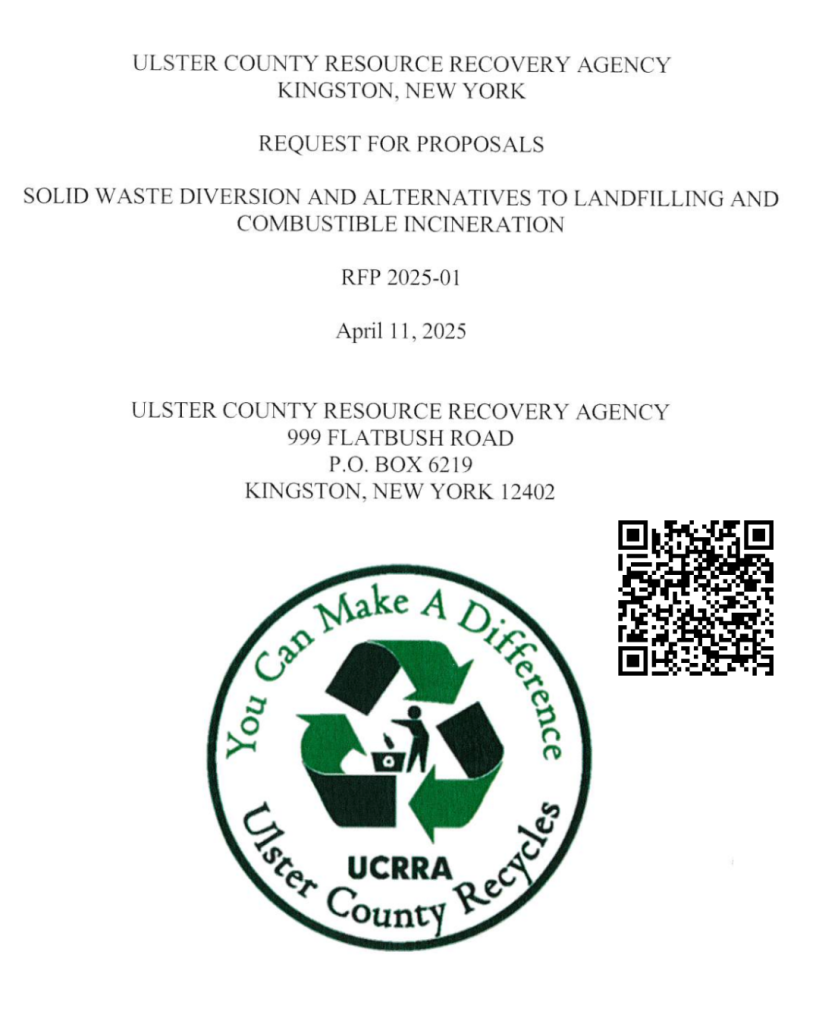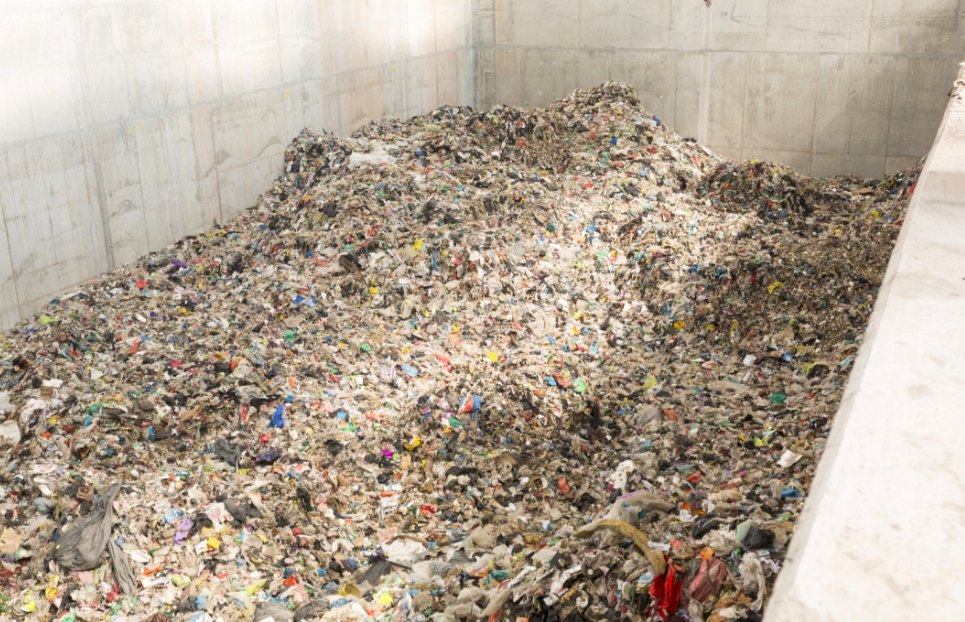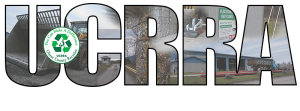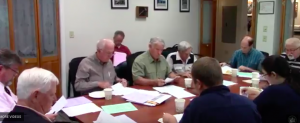
“Right now … once it gets to [single-stream] stage, it’s worthless. So that’s just the unfortunate reality — that we’ve taken that vision … and screwed it up.”
– David Gordon, UCRRA Board Member
By Rebecca Martin
Last week, both elected officials and the public learned from an article in the local paper that the Ulster County Resource Recovery Agency (UCRRA) “announced plans to stop single-stream, or commingled, recyclables in 2019 and proposed doubling the fees for single-stream loads until the new policy was in place.” Kingston Mayor Steve Noble took swift action with a letter in response that provided specific actions for the public to take.
There are two important upcoming meetings in May for the public. The first, the Ulster County Legislature’s Energy and Environment Committee will meet on Thursday, May 3rd at 5:30pm (at UCRRA located at 999 Flatbush Road in Kingston, NY) and, more importantly in order for your voice to be heard, a public hearing is set for May 23rd (VIEW our facebook event) with a potential vote to follow that would establish both new policy and a higher fee for our current commingled system imposed upon Kingston.
WHAT IS UCRRA?
In 1986, the Ulster County Legislature obtained authorization from the State Legislature for the creation of the Ulster County Resource Recovery Agency (the “Agency”), a public benefit corporation which was formed for the purpose of developing, financing, and implementing a comprehensive Countywide solid waste management program. In the mid-1980’s, after new initiatives to close non-complying exiting landfills were undertaken by the NYSDEC and strict requirements for the siting, construction, and operation of new disposal facilities were enacted, many communities found it beyond their financial and managerial capability to continue to dispose of waste in traditional ways. Consequently, many of the local municipalities in Ulster County requested that the Ulster County government assume the responsibility for solid waste management, and the Agency was created by the New York State Legislature pursuant to Chapter 936 of the Public Authorities Law approved December of 1986. The Agency’s organizational structure consists of a five-member Board of Directors (appointed by the Ulster County Legislature); an Executive Director; Agency Counsel; and thirty administrative and operations personnel.
The Ulster County Resource Recovery Agency (UCRRA) currently owns and operates two transfer stations. The first is located at 999 Flatbush Road in the Town of Kingston and the other on Clearwater Road in the Town of New Paltz. The property for the New Paltz Transfer Station is leased from the town.
DUAL STREAM AND SINGLE STREAM RECYCLING
Dual stream recycling keeps paper in one container and other recyclables—such as plastic and metal—in another. Proponents of duel-stream recycling say that contaminants are eliminated from paper products by separating them, costing less in processing and allowing more of the end product to be re-used.
With single stream (or co-mingled) recycling, rather than sorting paper from other recyclables—such as metal and glass—residents place everything into the recycling cart together. Proponents of single-stream recycling say that it makes recycling easier to do. And when recycling is easier, more people may participate—raising recycling rates and increasing the amount of material that’s diverted from the landfill.
Single stream is Kingston’s current system, and we made a large investment in order to do so between 2011 and 2013. Some of our readers may remember when Kingston made that transition. It required large purchases such as new collection trucks and garbage/recycling bins.
THE COSTS
Along with the transition of trucks and bins, based on numbers from 2010, Kingston pays $71 per ton to ship our garbage up-river some 250 miles. That number is most certainly higher now, and may even be closer to $100 per ton today. It is clear that keeping materials that can be recycled out of the trash stream is a big savings to both the budget and the environment.
As for recycling costs, according to a recent Daily Freeman article, “Kingston pays $20 per ton for commingled loads…” and from what I understand, our city also pays its fair share in offsetting the cost of recycled paper products that are contaminated.
Single stream recycling is not a new concept in Ulster County. Although Kingston is the only municipality who does so through UCRRA, other communities in Ulster County engage in single stream recycling through private haulers without any trouble.
Recent articles shared state that China is not accepting our recycled materials, a major link in the chain. According to some, without a buyer, our bailed recycled materials will sit in storage before eventually going into the landfill. Is that the case for private haulers in Ulster County who accept single-stream, too? Why then does a city like Seattle for instance, managing far more recycling than UCRRA does, continue to run it’s large, successful single-stream recycling program with a buyer for their recycled products?
THE ULSTER COUNTY LEGISLATURE.
The Ulster County Legislature appoints the five-member body to constitute the UCRRA Board and has both a Recycling Oversight Committee (where UCRRA Board member and Kingston resident Charlie Landi is appointed as liaison) and an Energy and Environment Committee that “set policy and review contracts pertaining to but not limited to the activities of the Ulster County Resource Recovery Agency”.
Although the announcement came out of the blue in Kingston, members of the UCRRA board say that Kingston’s single-stream recycling has been a problem for many years. Did the legislature, who oversees UCRRA, know this or were they caught off guard, too?
KINGSTON’S REPRESENTATIVE ON UCRRA’S BOARD.
Kingston’s representative on UCRRA’s board is former Ward 3 Alderman Charlie Landi who once stated that bottling Kingston’s municipal water would make good economic sense for Kingston.
Also on the board is the former Town of Ulster supervisor Fred Wadnola. It has been told that Wadnola negotiated a water deal with the City of Kingston decades ago for the town during his term. As I understand it, the deal with its high rate has been trying for the town, and is one that the current town administration has been trying to find a way out of or at the very least renegotiate since at least leading up to the proposed Niagra Bottling Proposal in 2014.
WHAT CAN YOU DO?
Given the magnitude of what the UCRRA board is proposing here by eliminating single-stream and it’s poor handling of the communications here in my opinion. Kingston should have the time that it needs to ‘sort through’ the problem.
SIGN
KingstonCitizens.org’s Petition, requesting the board postpone the vote and to create additional public hearings.
ATTEND
The upcoming Public Hearing on May 23rd (click on the link to be taken to our Facebook event for more information) to speak to the UCRRA Board’s proposed changes.
1) POSTPONE VOTE. The Ulster County Resource and Recovery Agency postpone its vote on the proposal for a minimum of 60 days to allow the Agency time to review the consequences of ending the acceptance of single-stream recycling on December 31st, 2018. Furthermore, to not consider fee increases to go into effect until at least January 1, 2019 to allow participating municipalities time to budget appropriately or consider alternative options.
2) ADDITIONAL PUBLIC HEARING. The Agency hold a second public hearing in Kingston to allow the public and all officials additional time to review the proposal and to understand how it would impact our community.
3) PROVIDE INFORMATION TO PUBLIC AND IMPACTED MUNICIPALITIES. The Agency research regional collection sites for single-stream recycling and provide a report to the public on its findings.


















